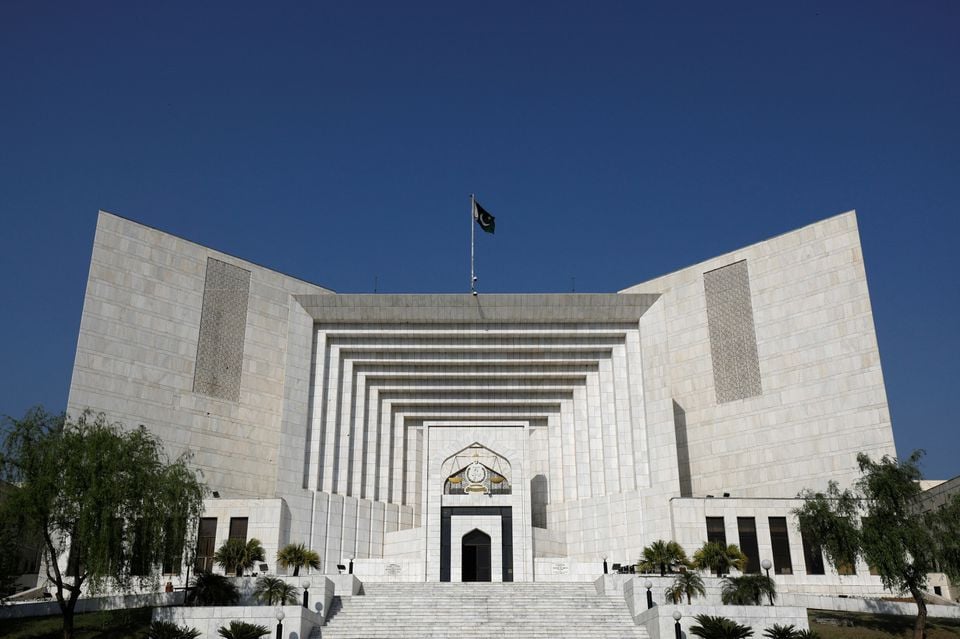ISLAMABAD: On Monday, the Supreme Court of Pakistan (SC) noticed that there was a difference between the court’s decision on a lifelong ban under Article 62 (1) (f) and the change that was made to the Election Act.

The meeting was set for January, and notices were sent to the attorney general of Pakistan (AGP) and the provincial advocate generals.
The court also sent the case to the judges’ committee to be put in front of a bigger bench for a hearing to find out the time limit for disqualification.
The top court was told about the case by Shamona Badshah Qaisrani, a former MPA of the Pakistan Muslim League-Nawaz (PMLN) who was kicked out of the party in 2014 for hiding her assets.
At today’s meeting, Justice Qazi Faez Isa pointed out that the SC had two different views on disqualification for life. “It looks like disqualification is strict in NAB [National Accountability Bureau] cases. He asked, “How long will the disqualification last in a murder case?”
Justice Athar Minallah pointed out that the case had to do with the 2018 elections and asked if it was possible to hear it now, since the next general election was coming up soon.
Later, though, the judge said that there was no doubt about the next polls and that anyone trying to push for them would be disrespectful to the highest court.
The court made it clear that this case could not be used to delay the elections on February 8, 2024. They asked that notes about the case be printed in two major English newspapers.
In 2018, a five-judge bench of the SC made a historic decision: someone who is disqualified under Article 62(1)(f) of the Constitution is disqualified for life.
Article 62(1)(f) of the Constitution of Pakistan says that a member of parliament must be “sadiq and ameen,” which means “honest and righteous.” On July 28, 2017, the Supreme Court bench ruled that former prime minister and PMLN chief Nawaz Sharif was not qualified to be a member of parliament because of the Panama Papers. A different judge of the highest court also threw out Jahangir Tareen, who used to be the leader of the Pakistan Tehreek-e-Insaf (PTI).
Late last year, legal experts found it interesting that someone who has killed someone can run for office again after a certain amount of time, but a politician who lies under oath can’t run again ever.
In January 2022, legal experts said it wasn’t fair that four of the judges—Saqib Nisar, Azmat Saeed Sheikh, Umar Ata Bandial, and Ijaz ul Ahsan—were from Punjab. They also said they didn’t trust the group that made the important decision. That bigger bench also had Justice Sajjad Ali Shah, who is from Sindh.
It’s interesting that most of these judges were on benches that made decisions in well-known cases.
It wasn’t until October 2018 that the Supreme Court finally set an objective test to see how honest a politician is. They said that Article 62(1)(f) could not be used for every omission or non-disclosure of assets.
Later, the court threw out Yar Muhammad Rind’s lifetime ban from politics because of a fake degree case, saying that such bans should be based on oral or written proof and not just assumptions.
In May, the highest court said again that it was a well-established rule that any lack of disclosure or mistake in disclosure would not be enough to forever disqualify a candidate or member of parliament under Article 62(1)(f).
It took 11 pages of writing for Justice Sayyed Mazahar Ali Akbar Naqvi to say, “The purpose and intention need to be seen behind the non-disclosure or misdeclaration.” The returned candidate would only be eliminated if they have gained assets dishonestly and are hiding them to get something good out of them.
The decision was made after a petition was filed by politician Shamona Badshah Qaisarani. She had been disqualified for life because she didn’t list the farmland she received from her parents in her nomination papers.
The court said that the explanation’s trustworthiness would show whether or not not disclosing an asset is dishonest.
Several lawyers had said that Tareen could not be banned for life because of the earlier ruling.
SC Judge Justice Qazi Faez Isa had also asked seven questions to find out who could be a politician.










































